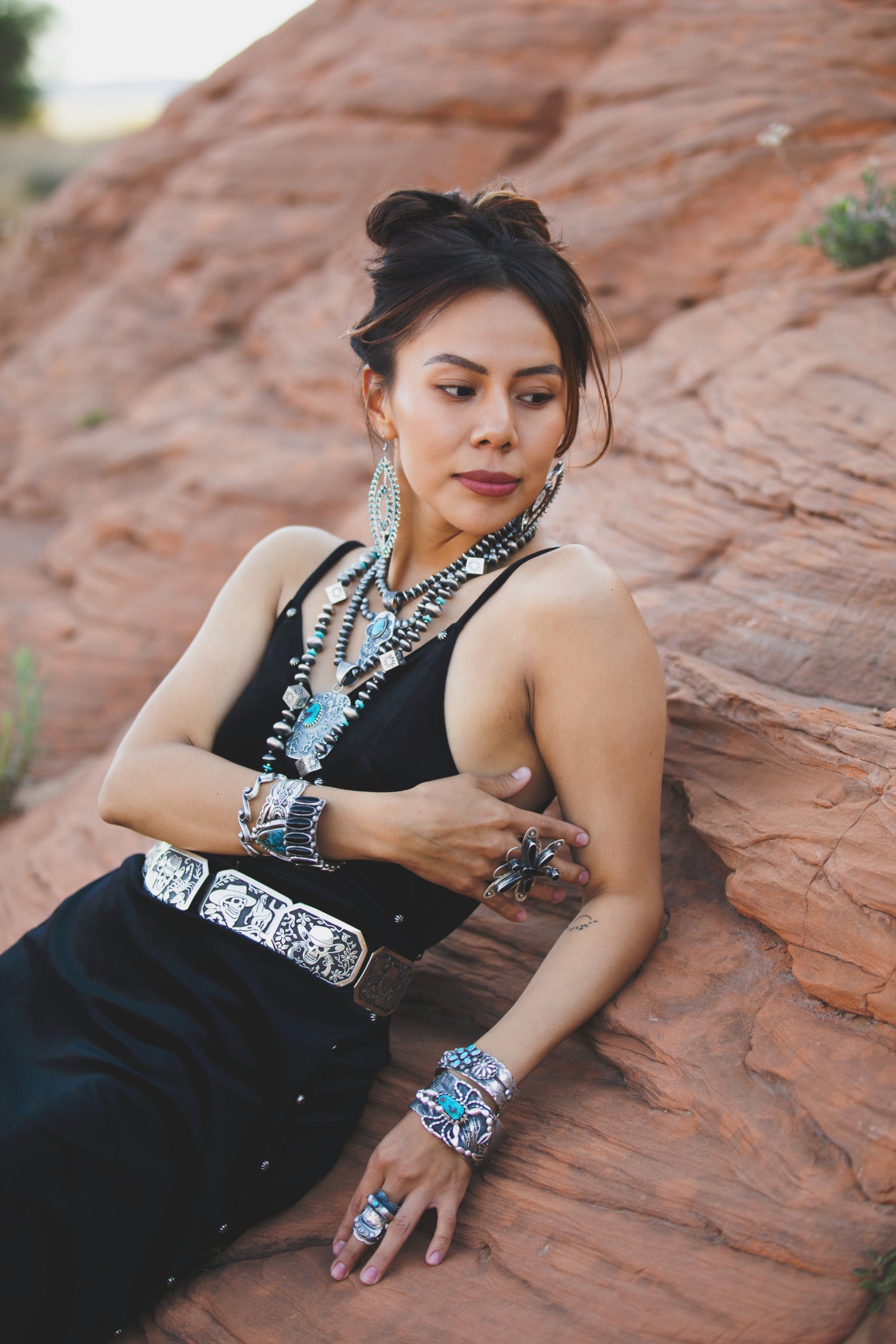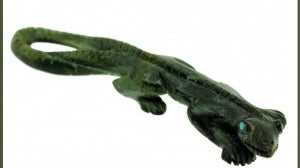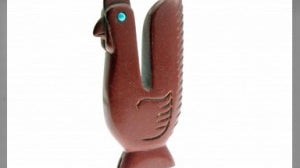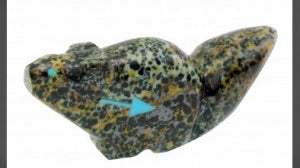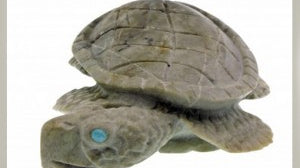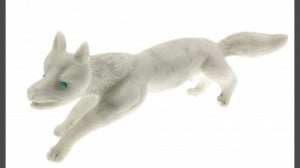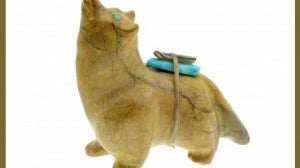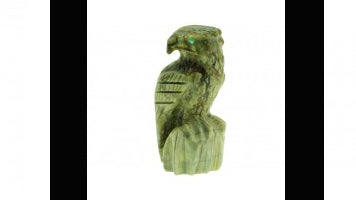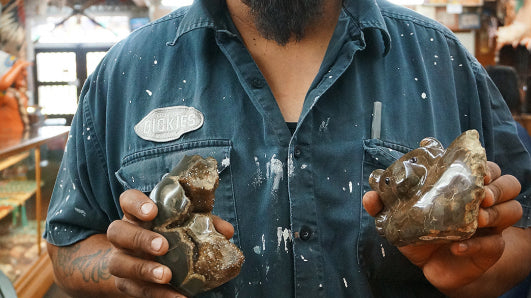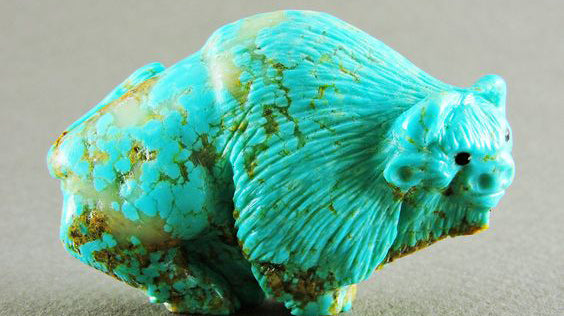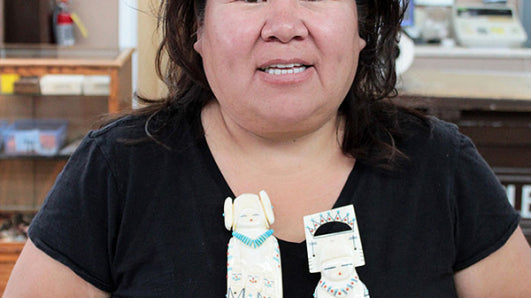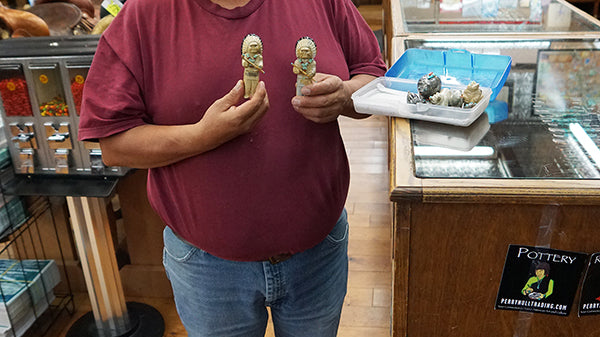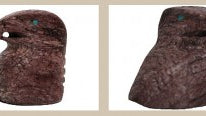Perry Null Trading
Serpentine - Zuni Fetish Carving Material
Serpentine is a beautiful group of about 20 related minerals, usually green, yellowish-green, or brownish-green in color. Its name is thought to be derived from its serpent-like green colors. Serpentine is sometimes also referred to as "Fish Rock". The material is usually translucent to opaque. It is a very common mineral, mined all over the world. Like many minerals used in Zuni carvings it is mined near the Zuni Reservation. In the Four Corners Area it is mined in Gila Co., Arizona, about 2 hours south of the Zuni Reservation.
Rooster Zuni Fetish Meaning
What is the Rooster Zuni Fetish Meaning? Anyone with a basic knowledge of chickens knowns that the rooster is always the first animal awake in the morning. The "early bird gets the worm," and the Zuni fetish of a rooster represents that tendency to rise early and to settle for nothing less than the very best of things. He is also considered vain and likes to be given attention and lavished with gifts.
Squirrel Zuni Fetish Meaning
What is the Squirrel Zuni Fetish Meaning? Squirrels are known for planning for the future and storing away things for a day when there is need for them. Fetishes play an important role in Zuni culture, and if you have a squirrel in your collection you may wonder what it represents. The squirrel embodies natural intelligence, saving, and the protection of reserves. He represents the ability to plan ahead and is very industrious.
Turtle Zuni Fetish Meaning
If you have a turtle or tortoise fetish you may wonder what it represents or why it is significant. What is the Turtle Zuni Fetish Meaning? The turtle is the oldest symbol of Mother Earth and represents longevity and is used for healing. Some believe that the possession of a turtle fetish allows one to defy death. He also represents water, which in the high dessert climate of Zuni is a precious commodity.
Wolf Zuni Fetish Meaning
What is the Wolf Zuni Fetish Meaning? The Wolf is guardian and master or prey god of the East. He is the younger brother of bobcat in the hunting directional set. of fetishes. In Zuni culture a fetish represents the animal spirit thought to reside in the stone. The wolf represents not just successful hunting, but also the ability to work together for the good of the group because of its pack mentality. It is a teacher, pathfinder, and represents a sharing of knowledge. He teaches inner guidance and clarity.
Travertine Zuni Rock Fetish Carving Material
Travertine is often thought of for countertops, backsplashes, and floors, but it's also a great medium for Zuni fetish carvers. It is even referred to as "Zuni Rock". Its found extensively in the Four Corners area in the Grand Canyon and Glenwood Canyon in Colorado. Its also found throughout Texas, Oklahoma, and most notably in Yellowstone National Park. Travertine Zuni Rock can be polished to a smooth, shiny finish, and comes in a variety of colors from grey to coral-red.
Zuni Fetishes
One of the most popular arts, nearly equal in importance to Zuni jewelry, is Zuni fetishes. The origin of small figures carved of shell and native stone goes so far back into ancient history it may be considered always part of Zuni culture. Unlike other art forms, Zuni fetishes were the sole property of that tribe. Carved animals of the hunt and the field, were traded to Navajos and other Pueblos. Today the Navajos have added fetishes to their talents, but they did not make them traditionally.
The word fetish has negative connotations in American English, but it was applied to these small carvings because they have protective and healing qualities. The Zunis traditionally had six prey animals for the six cardinal directions (counting zenith and nadir—up and down) and the most senior prey animal is the mountain lion. These days the term “Beast Gods” is often used but the Zunis object to the designation as misleading. Clearly it is good marketing. It sounds more powerful than “prey animals.”
Orin Eriacho - Zuni Fetish Carver
Orin Eriacho grew up in the big rock house south of the Zuni river built by Henry Gasper. The home is most associated with the Tsabetsaye family, and linked to the Walelas. Like most Zunis, Orin was surrounded by creativity and family celebrity, but his entry into the art world came out of his own interests.
Maxx Laate
Maxx Laate comes from a family of famous Zunis. Less well known is that many of the other top carvers are his brothers and nephews because they go by other surnames. They have mostly lived near each other and Maxx’s brother Pernell has been an inspiration and teacher for many of them, though Zunis don’t teach in the way schools do.
Can Your Bear Dance?
Study shows French prehistoric paintings ‘oldest and most elaborate’. Remarkably, agreeing with the radiocarbon dates of the human and animal occupancy, this study confirms that the Chauvet cave paintings are the oldest and the most elaborate ever discovered, challenging our current knowledge of human cognitive evolution”, said the study.
Freddie & Enrique Leekya
In the recent book Leekya: Master Carver of Zuni Puebloby Deborah Slaney, Leekya’s grandchildren don’t get much attention. Of course the book is about Old Man Leekya but the examples of work by the grandsons are not very representative of their extraordinary work.

